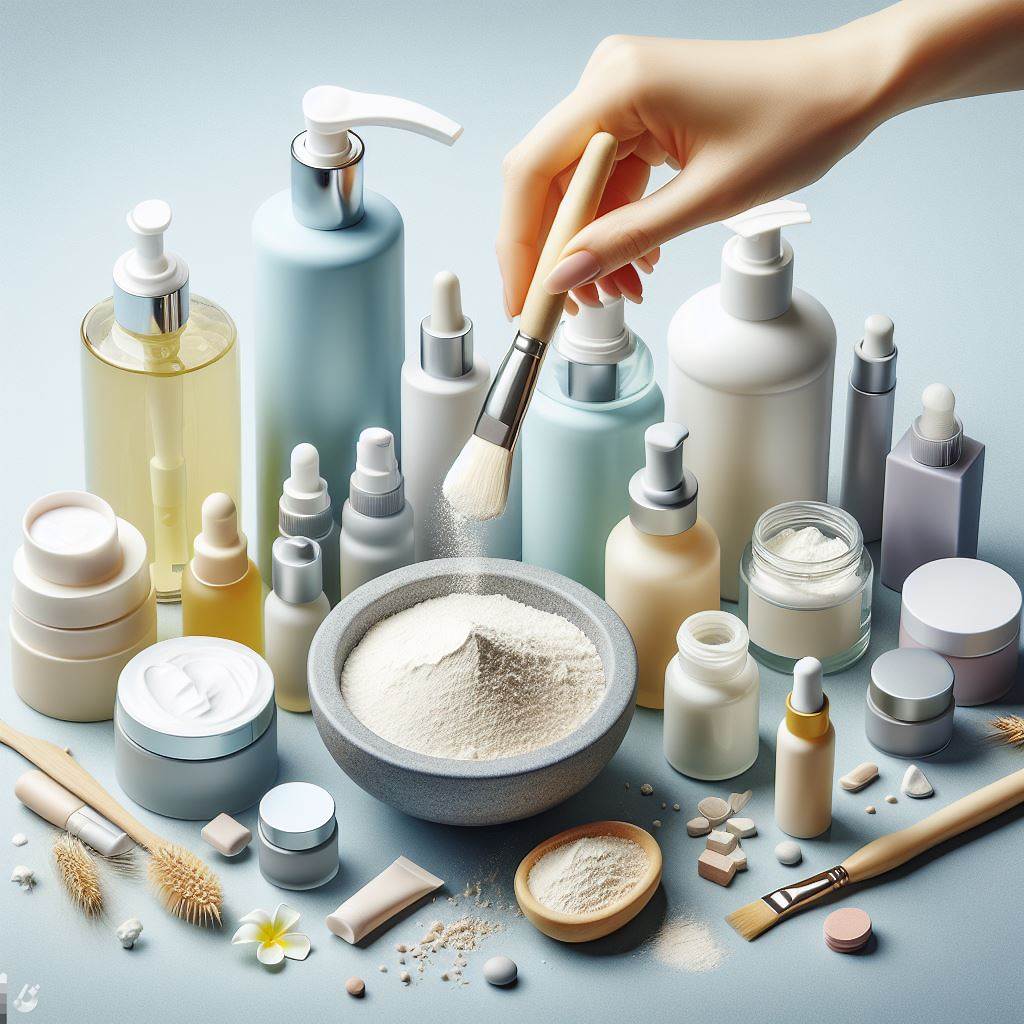Niacinamide, the skincare industry’s latest buzzword, is making waves as a powerful and versatile cosmetic ingredient. Known for its multitude of benefits, this wonder ingredient is capturing the attention of skincare enthusiasts and professionals alike.
What is Niacinamide?
Niacinamide, also known as nicotinamide, is a form of vitamin B3 that has gained popularity in the skincare world. Unlike other forms of vitamin B3, such as niacin, niacinamide does not cause flushing or irritation, making it suitable for all skin types. It is a water-soluble vitamin that can be found in various foods like meat, fish, eggs, and leafy green vegetables.

Benefits of Using Niacinamide in Skincare
Niacinamide offers an impressive range of benefits for the skin, making it a sought-after ingredient in many skincare products. One of its key advantages is its ability to improve skin texture. Niacinamide helps to strengthen the skin’s barrier, which can result in smoother, more supple skin. It also has the potential to reduce the appearance of fine lines and wrinkles, making it a valuable addition to anti-aging skincare routines.
In addition to its texture-improving properties, niacinamide also has pore-minimizing effects. By regulating sebum production and reducing inflammation, niacinamide can help to shrink the appearance of pores, giving the skin a more refined and even look.
Furthermore, niacinamide is well-known for its brightening and clarifying properties. It inhibits the transfer of melanin, the pigment responsible for skin color, which can help reduce the appearance of hyperpigmentation and even out skin tone. This makes niacinamide a popular choice for individuals struggling with dark spots, acne scars, and sun damage.
The Science Behind Niacinamide’s Effectiveness
Niacinamide’s effectiveness in skincare is backed by scientific research. Studies have shown that niacinamide can increase the production of ceramides, which are essential for maintaining a strong skin barrier. By strengthening the skin’s protective barrier, niacinamide helps to retain moisture and keep the skin hydrated, resulting in a plump and healthy complexion.
Moreover, niacinamide has been found to have antioxidant properties, meaning it can help protect the skin from environmental damage caused by free radicals. Free radicals are unstable molecules that can damage collagen and elastin, leading to premature aging. By neutralizing these harmful molecules, niacinamide helps to keep the skin looking youthful and radiant.
Additionally, niacinamide has anti-inflammatory properties that can help soothe and calm irritated skin. Whether you’re dealing with redness, sensitivity, or acne, niacinamide can provide relief and promote a more balanced complexion. Its anti-inflammatory effects make it particularly beneficial for individuals with sensitive or acne-prone skin.
Common Skincare Concerns that Niacinamide Can Address
Niacinamide is a versatile ingredient that can address a wide range of common skincare concerns. One of its primary uses is in anti-aging skincare. By improving skin texture, reducing the appearance of fine lines and wrinkles, and boosting collagen production, niacinamide can help to turn back the clock and rejuvenate the skin.
Furthermore, niacinamide is highly effective in targeting hyperpigmentation and uneven skin tone. Whether caused by sun damage, hormonal changes, or acne scars, niacinamide can help fade dark spots and promote a more even complexion.
For those struggling with acne, niacinamide can be a game-changer. Its ability to regulate sebum production, reduce inflammation, and minimize the appearance of pores makes it an excellent addition to acne-fighting skincare routines. Niacinamide can help to control excess oil, prevent clogged pores, and soothe inflamed skin, leading to a clearer and calmer complexion.

How to Incorporate Niacinamide into Your Skincare Routine
Incorporating niacinamide into your skincare routine is easy and can be done in several ways. The most common way to use niacinamide is through the application of serums or creams. These products typically contain a concentration of niacinamide that is safe and effective for daily use.
To introduce niacinamide into your routine, start by cleansing your face thoroughly. Follow up with a toner to balance the skin’s pH levels and prepare it for the absorption of active ingredients. Next, apply a few drops of niacinamide serum or a small amount of niacinamide cream to your face and gently massage it in. Allow the product to fully absorb before moving on to the next step.
After applying niacinamide, it’s important to lock in moisture with a moisturizer. This helps to seal in the benefits of niacinamide and keep the skin hydrated throughout the day or night. Finish off your routine with sunscreen during the day to protect your skin from harmful UV rays.
Niacinamide Products to Try
With the growing popularity of niacinamide, there is no shortage of products to choose from. Whether you prefer serums, creams, or masks, there is a niacinamide-infused product to suit your skincare needs.
Some popular niacinamide products include:
1. The Ordinary Niacinamide 10% + Zinc 1%: This affordable serum is a cult favorite for its high concentration of niacinamide and zinc, which helps regulate sebum production.
2. Paula’s Choice 10% Niacinamide Booster: This lightweight serum is formulated with a potent blend of niacinamide, vitamin C, and peptides to target multiple skin concerns.
3. Drunk Elephant F-Balm Electrolyte Waterfacial: This overnight mask combines niacinamide with other hydrating ingredients to plump and nourish the skin while you sleep.
4. Glossier Super Pure: This serum contains a blend of niacinamide and zinc to calm and clarify troubled skin, making it an excellent choice for acne-prone individuals.
Potential Side Effects and Precautions
Niacinamide is generally considered safe for most individuals when used topically. It is well-tolerated and rarely causes any adverse reactions. However, as with any skincare ingredient, it’s essential to patch test new products containing niacinamide before applying them to your entire face. This will help determine if you have any sensitivity or allergies to the ingredient.
In rare cases, niacinamide may cause mild irritation or redness, especially if used in high concentrations. If you experience any discomfort or adverse effects, discontinue use and consult a dermatologist.
Niacinamide Myths Debunked
As with any popular skincare ingredient, there are often myths and misconceptions surrounding niacinamide. Let’s debunk some of the most common ones:
1. Myth: Niacinamide causes purging. Purging is a term used to describe a temporary worsening of the skin when using certain active ingredients. However, niacinamide does not cause purging. If you experience a sudden breakout after using a niacinamide product, it may be due to other factors such as comedogenic ingredients or an incompatible product.
2. Myth: Niacinamide cannot be used with vitamin C. There is a common belief that niacinamide and vitamin C should not be used together as they can cancel out each other’s benefits. However, combining niacinamide and vitamin C is safe and effective. Research has shown that they can work synergistically to improve the skin’s overall health and appearance.
3. Myth: Niacinamide is only for oily skin types. Niacinamide is suitable for all skin types, including dry and sensitive skin. Its ability to strengthen the skin’s barrier and retain moisture makes it beneficial for individuals with dry or dehydrated skin.
Niacinamide vs. Other Skincare Ingredients
Niacinamide is often compared to other popular skincare ingredients, such as retinol and hyaluronic acid. While these ingredients have their own unique benefits, niacinamide offers a well-rounded approach to skincare.
Compared to retinol, niacinamide is generally better tolerated and less likely to cause irritation or dryness. It can be used in conjunction with retinol to enhance its benefits and minimize potential side effects.
As for hyaluronic acid, it primarily focuses on hydration and plumping the skin. Niacinamide, on the other hand, offers a broader range of benefits, including texture improvement, pore reduction, and brightening.
Moving Forward: Power of Niacinamide in Skincare
Niacinamide is undoubtedly a game-changer in the world of skincare. With its ability to improve skin texture, reduce fine lines and wrinkles, minimize pores, and brighten the complexion, niacinamide has become a staple ingredient in many skincare routines.
Whether you’re looking to improve the overall health and appearance of your skin or target specific concerns like hyperpigmentation or acne, niacinamide can help you achieve your skincare goals. Its versatility, coupled with its impressive scientific backing, makes it a must-have ingredient for anyone seeking radiant and healthy skin.
Embrace the wonders of niacinamide and elevate your skincare routine to new heights. Discover the transformative effects of this incredible cosmetic ingredient and unlock a newfound confidence in your complexion.
Niacinamide in Skincare References
Niacinamide – mechanisms of action and its topical use